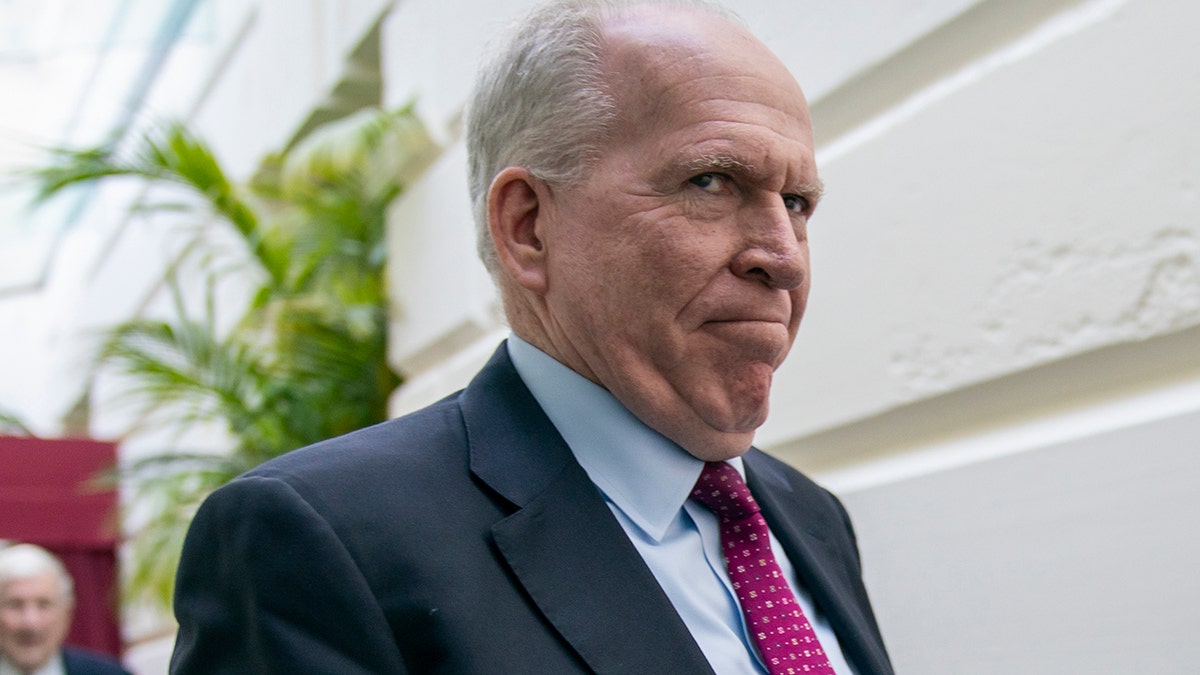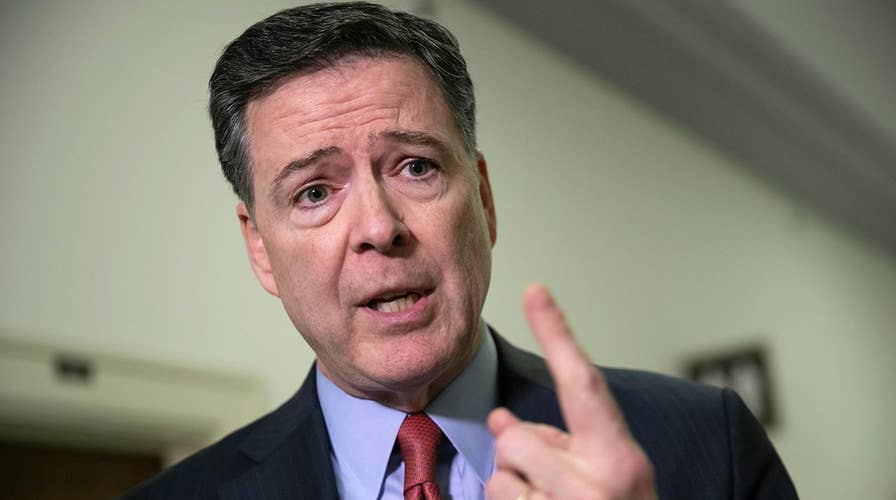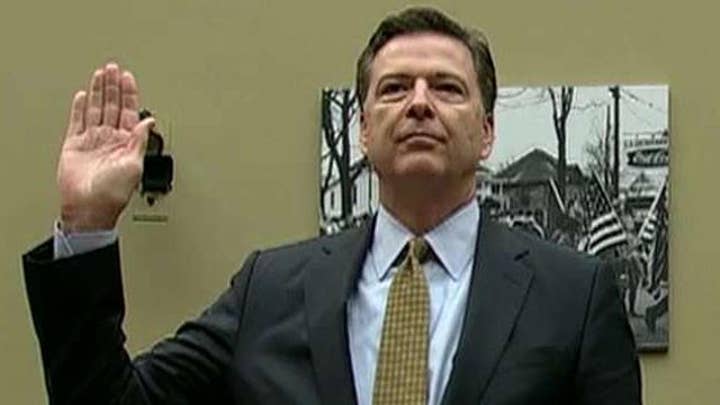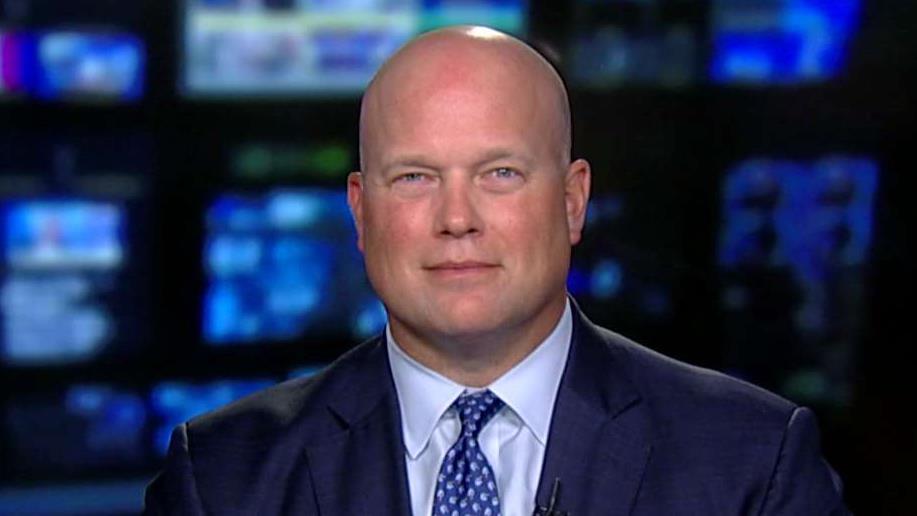James Trusty on Comey IG report: He's too important to be bound by the rules he's well aware of
Former DOJ prosecutor James Trusty on what brought down former FBI Director James Comey.
Findings by the Department of Justice inspector general released Thursday are raising new questions about the critical May 2017 timeline leading up to the appointment of Special Counsel Robert Mueller and former FBI Director James Comey's testimony before the Senate Intelligence Committee.
Comey testified that it was Trump's May 12, 2017, tweet about possible White House tapes that prompted him to wake up "in the middle of the night" days later, convinced that he needed to leak the contents of one of his sensitive memos documenting his conversations with Trump. Such a leak, Comey reasoned, would result in an investigation that would uncover any tapes created by the president.
But the 83-page report released Thursday by the Department of Justice inspector general revealed that on the afternoon of May 14, 2017 -- the Sunday before that alleged late-night episode occurred -- Comey sent four of the memos to one of his attorneys, Patrick Fitzgerald, "with instructions to share the email and PDF attachment with [attorney David] Kelley and [Columbia Law School professor Daniel] Richman."
There were no indications that Comey told Richman, his longtime friend and adviser, to leak the documents at that time. Fitzgerald forwarded the documents to Kelley at 7:35 a.m. on May 17, and to Richman on May 17 at 10:13 a.m.
COMEY VIOLATED FBI POLICIES, SCATHING IG REPORT FINDS
However, on the morning of May 16, Comey separately sent a digital photograph of one of his memos specifically to Richman, with explicit instructions to share the substance of the memo with a New York Times reporter.
On May 16, 2017, based on a leak from Richman at Comey's direction, The New York Times ran a story documenting the memos and bearing the headling "Comey Memo Says Trump Asked Him to End Flynn Investigation."
Richman was also the source of a May 11 New York Times article that described Comey's private conversations with "associates," in which Comey said Trump had requested a loyalty pledge from Comey. That article prompted Trump to tweet, "James Comey better hope that there are no 'tapes' of our conversations before he starts leaking to the press!"
Separately, the IG report probed Comey's honesty during his congressional testimony, when Maine Republican Sen. Susan Collins asked him, "Did you show copies of your memos to anyone outside of the Department of Justice."
"Yes," Comey said.
"And to whom did you show copies?" Collins asked.
"I asked — the president tweeted on Friday after I got fired that I better hope there's not tapes. I woke up in the middle of the night on Monday night because it didn't dawn on me originally, that there might be corroboration for our conversation," Comey said.
"There might a tape," Comey continued. "My judgment was, I need to get that out into the public square. I asked a friend of mine to share the content of the memo with a reporter. Didn't do it myself for a variety of reasons. I asked him to because I thought that might prompt the appointment of a special counsel. I asked a close friend to do it."
Comey later told the IG that he had provided the memos to Richman -- but was faulted for not mentioning that he had also given the documents to his lawyers.
In conversations with the IG, Comey blamed Collins for not asking "follow-up questions," and explained that he felt he "was trying to answer the question that was asked, and not reveal confidential communications with my lawyers." Comey drew a distinction between conversations with his lawyer for legal advice and conversations with Richman for the purposes of leaking information.
Other apparent issues with Comey's honesty were laid bare in the IG report. For example, the report made clear that even as Comey assured Trump that he was not personally under investigation, the former FBI director and his top deputies went to great lengths to confront Trump at a Jan. 6, 2017, meeting at Trump Tower with the salacious accusations in the dossier drafted by British ex-spy Christopher Steele.
"Comey set a dangerous example for the over 35,000 current FBI employees—and the many thousands more former FBI employees. ..."
CIA Director John Brennan, Director of National Intelligence (DNI) James Clapper, and National Security Agency (NSA) Director Mike Rogers were also in attendance at the Trump Tower meeting. But the group "agreed that the briefing" on the dossier claims "needed to be one-on-one, so that Comey could present the 'salacious' information in the most discreet and least embarrassing way."
The goal, according to the FBI officials, was to see if Trump would "'make statements about or provide information of value to the pending Russia interference investigation' known as 'Crossfire Hurricane.'"
After Comey revealed the dossier claims to Trump, he observed the president's reactions and quickly documented them for investigative purposes, the IG recounted.
"Comey said he had a secure FBI laptop waiting for him in his FBI vehicle and that when he got into the vehicle, he was handed the laptop and 'began typing as the vehicle moved,'" the IG report stated. That section of the IG report was first flagged by The Washington Examiner's Byron York.
'THOROUGHLY DISGRACED': TRUMP, TOP REPUBLICANS RIP COMEY
Comey later headed to the New York FBI field office to discuss the matter in a secure videoconference with other members of the Crossfire Hurricane team, according to the report.
News that Trump had been briefed on the accusations by top FBI brass was later leaked to CNN, and provided the impetus for the network to report on the dossier's existence.

Former CIA Director John Brennan. (AP Photo/J. Scott Applewhite)
"We have a CNN exclusive for you now," anchor Jake Tapper said Jan. 10, 2017. "CNN has learned that the nation's top intelligence officials provided information to President-elect Donald Trump and to President Barack Obama last week about claims of Russian efforts to compromise the president-elect," citing "a former British intelligence operative whose past work U.S. intelligence officials consider to be credible."
CNN did not mention that Steele was funded by the Hillary Clinton campaign and the Democratic National Committee (DNC), and it did not reveal which participant in the meeting had leaked the news about the dossier briefing.
The IG is separately working on a report into broader potential intelligence community surveillance abuses.
Meanwhile, Republicans lined up to Hammer Comey based on the IG's findings.
"Perhaps never in the history of our Country has someone been more thoroughly disgraced and excoriated than James Comey in the just released Inspector General’s Report. He should be ashamed of himself!" Trump tweeted.
“By leaking his confidential communications with the president in an attempt to save face in the wake of his firing, Mr. Comey believed he was above the rules of the DOJ,” Rep. Jim Jordan, R-Ohio, the ranking member of the House Committee on Oversight and Reform, said in a statement. “His actions were disgraceful and part of a wider effort within the Obama Justice Department to undermine President Trump.”
The IG report looked into memos Comey wrote between January 2017 and April 2017 about conversations with Trump that Comey found unnerving or unusual. These include a dinner at which Comey says Trump asked him to pledge his loyalty to him and a private Oval Office meeting weeks later at which Comey says the president asked him to drop an FBI investigation into Flynn.
The Justice Department's official watchdog concluded that the memos Comey kept were, in fact, "official FBI records," and said Comey set a "dangerous example" with his actions.
The IG report outlined a series of violations, including that he broke FBI policies and the bureau's employment agreement "by providing one of the unclassified memos that contained official FBI information, including sensitive investigative information, to his friend with instructions for the friend to share the contents of the memo with a reporter."
Further, the IG determined that Comey kept copies of four memos (out of the total seven he drafted) in a personal safe at home after his removal as director -- and in doing so "violated FBI policies and his FBI Employment Agreement by failing to notify the FBI that he had retained them."
The IG said Comey again violated the rules "by providing copies ... of the four memos he had kept in his home to his three private attorneys without FBI authorization," and by failing to alert the FBI once he learned one of the memos contained sections later deemed classified at the confidential level.
"By not safeguarding sensitive information obtained during the course of his FBI employment, and by using it to create public pressure for official action, Comey set a dangerous example for the over 35,000 current FBI employees—and the many thousands more former FBI employees—who similarly have access to or knowledge of non-public information," the report stated.
The IG added: "Were current or former FBI employees to follow the former Director's example and disclose sensitive information in service of their own strongly held personal convictions, the FBI would be unable to dispatch its law enforcement duties properly."
CLICK HERE TO GET THE FOX NEWS APP
While the findings of the probe were forwarded to the DOJ, the department has declined prosecution, as Fox News reported earlier this month. But for Comey, who has cultivated the image of a by-the-book and irreproachable leader since his termination in 2017, the review shined a harsh light on his decisionmaking in the final, beleaguered weeks of his tenure at the head of the nation's top law enforcement agency.
For his part, Comey zeroed in on a section that said he didn't leak classified material directly to the media -- and urged his critics to tell him "sorry we lied about you."
Fox News' Brooke Singman and The Associated Press contributed to this report.






